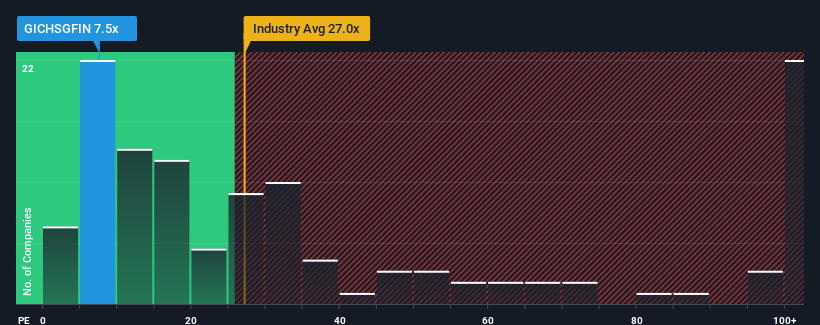- India
- /
- Diversified Financial
- /
- NSEI:GICHSGFIN
Market Cool On GIC Housing Finance Limited's (NSE:GICHSGFIN) Earnings

GIC Housing Finance Limited's (NSE:GICHSGFIN) price-to-earnings (or "P/E") ratio of 7.5x might make it look like a strong buy right now compared to the market in India, where around half of the companies have P/E ratios above 32x and even P/E's above 60x are quite common. However, the P/E might be quite low for a reason and it requires further investigation to determine if it's justified.
For example, consider that GIC Housing Finance's financial performance has been poor lately as its earnings have been in decline. One possibility is that the P/E is low because investors think the company won't do enough to avoid underperforming the broader market in the near future. However, if this doesn't eventuate then existing shareholders may be feeling optimistic about the future direction of the share price.
See our latest analysis for GIC Housing Finance

How Is GIC Housing Finance's Growth Trending?
In order to justify its P/E ratio, GIC Housing Finance would need to produce anemic growth that's substantially trailing the market.
Retrospectively, the last year delivered a frustrating 19% decrease to the company's bottom line. Even so, admirably EPS has lifted 3,156% in aggregate from three years ago, notwithstanding the last 12 months. Although it's been a bumpy ride, it's still fair to say the earnings growth recently has been more than adequate for the company.
This is in contrast to the rest of the market, which is expected to grow by 25% over the next year, materially lower than the company's recent medium-term annualised growth rates.
In light of this, it's peculiar that GIC Housing Finance's P/E sits below the majority of other companies. Apparently some shareholders believe the recent performance has exceeded its limits and have been accepting significantly lower selling prices.
The Bottom Line On GIC Housing Finance's P/E
It's argued the price-to-earnings ratio is an inferior measure of value within certain industries, but it can be a powerful business sentiment indicator.
Our examination of GIC Housing Finance revealed its three-year earnings trends aren't contributing to its P/E anywhere near as much as we would have predicted, given they look better than current market expectations. There could be some major unobserved threats to earnings preventing the P/E ratio from matching this positive performance. It appears many are indeed anticipating earnings instability, because the persistence of these recent medium-term conditions would normally provide a boost to the share price.
Plus, you should also learn about these 2 warning signs we've spotted with GIC Housing Finance (including 1 which doesn't sit too well with us).
You might be able to find a better investment than GIC Housing Finance. If you want a selection of possible candidates, check out this free list of interesting companies that trade on a low P/E (but have proven they can grow earnings).
New: Manage All Your Stock Portfolios in One Place
We've created the ultimate portfolio companion for stock investors, and it's free.
• Connect an unlimited number of Portfolios and see your total in one currency
• Be alerted to new Warning Signs or Risks via email or mobile
• Track the Fair Value of your stocks
Have feedback on this article? Concerned about the content? Get in touch with us directly. Alternatively, email editorial-team (at) simplywallst.com.
This article by Simply Wall St is general in nature. We provide commentary based on historical data and analyst forecasts only using an unbiased methodology and our articles are not intended to be financial advice. It does not constitute a recommendation to buy or sell any stock, and does not take account of your objectives, or your financial situation. We aim to bring you long-term focused analysis driven by fundamental data. Note that our analysis may not factor in the latest price-sensitive company announcements or qualitative material. Simply Wall St has no position in any stocks mentioned.
About NSEI:GICHSGFIN
Mediocre balance sheet second-rate dividend payer.
Similar Companies
Market Insights
Community Narratives




